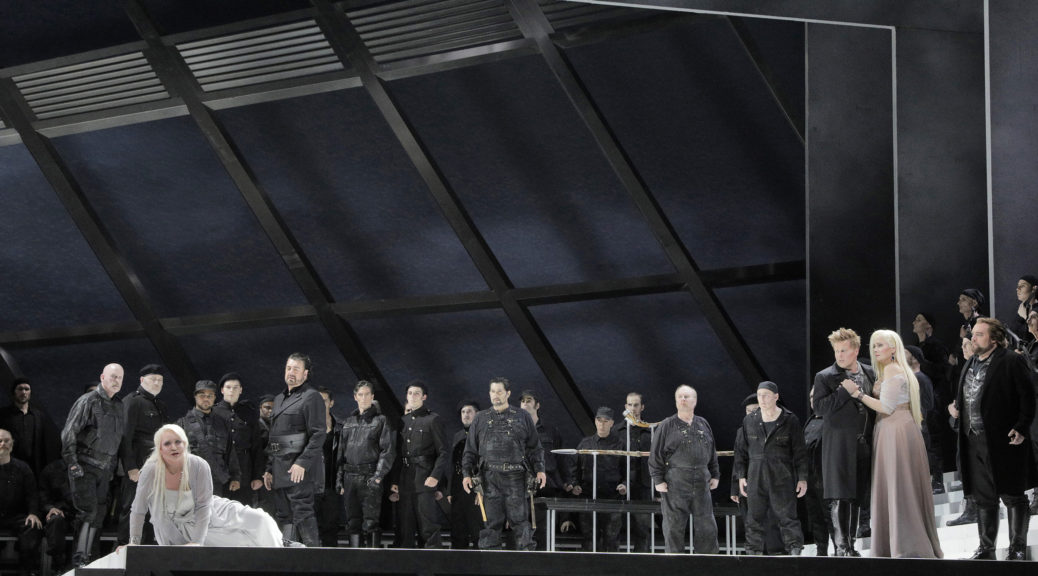
POWER LUST AND POLLUTION IN WAGNER FINALE
You can blame us music critics for all the long, uncut Wagner opera performances, as in the four “Ring” works currently on the boards. Whenever cuts are actually made in five-hour-long operas, you can bet that some one will complain in print.
Well, the Wagner operas can benefit from cuts, which are made even at the holiest of the holy, the Bayreuth (Germany) Wagner Festival. These works are clogged with static narration, particularly recounting of the drama that had gone before. In the “Ring” cycle it’s much more understandable than enjoyable, as Wagner wrote the libretti in reverse order over the years, perhaps unsure if the forerunner would get composed; so each time, he told what went previously, and later composed that very scenario in a companion opera.
Thus the grand, bigger-than-life finale opus “Götterdämmerung” (Twilight of the Gods), 5:15 in duration, is over-ballasted by gratuitous narration, sapping the emotional potency of a masterpiece. The focal hunt scene, the flow to Siegfried’s murder-cum-unforgettable-Funeral-Music, and the “Ring” resolution’s Immolation Scene——all are hobbled when the hero starts telling his life story, which by now all the Ring-goers know verbatim from the forerunning pieces.
If conciseness was in short supply in the current S.F. Opera “Götterdämmerung,” little else was. It’s an elaborate tragedy of gods and villains entwined in magic, disguises, spells, horses (happily parked off-stage), chicanery, murder, nightmares, lovers torn asunder and deceit. It closes a 17-hour circle of drama and performances with the heroine Brünnhilde’s peace offering of the (accursed) magic ring reverting to its home in the Rhine River, after it has been torn from the fingers of a half-dozen thieves, beloveds, cadavers and opportunists.
Accompanying this is the visually feeble staging of the Immolation Scene—-little more than a cub-scout campfire on the Opera House stage (perhaps result of too many drought-related fire warnings this season??).
Toss out all expectation of tender human emotions; “Götterdämmerung” is all about human lust for power, with the machinations by the villains (Hagen, Gunther) dominant for all but two scenes. To underline this theme, “Ring” Director Francesca Zambello has turned the top god Wotan into a terrestrial industrialist and CEO, whose factories spew soot, smoke and chemicals, turning both the landscape and the apparel very dark. Even in the Rhine River huge piles of trash and plastic attest to the destruction of our habitats by greedy powers-that-be—one of Zambello’s insightful shifts in her more modern view of Wagner. (The authentic stage directions are routinely ignored by stage directors around the world. Furthermore the supertitle translations are adapted to fit each new thrust freely.)
Less welcome was Zambello’s deletion of the procession to accompany one of Wagner’s noblest and most heart-rending orchestral segments, “Siegfried’s Funeral Music.”
Still, this is a powerful opera and production regardless of shading, with a great, nuanced orchestral score reflecting both scenes and stellar figures, peppered with the musical I.D. of leitmotifs. The “Ring” return of the soulful conductor Donald Runnicles after that famous SFO spat-hiatus, and what the orchestra produced again for him, was enough to make any Wagnerian drop to his knees in abject gratitude.
The singer-actors were admirable, though not as trumpety as some precedessors. These included Daniel Brenna (Siegfried), soprano Iréne Theorin, (Brünnhilde), Andrea Silvestrelli (Hagen), Brian Mulligan (Gunther), and Gutrune Citro (Gutrune). What Theorin lacked in the low voice range she made up for at the high end.
At the end, the colossal impact of “Götterdämmerung” as the bookend of the “Ring” cycle inevitably takes your breath away. But I always think back to what might have been, had Wagner been equipped with a good pair of shears to trim this magnum opus.
POSTLUDE REFLECTIONS—At the conclusion, not just Valhalla but the world itself is consumed by fire. Asked if he planned to go hear “Götterdämmerung,” one local quipped, “But of course! I wouldn’t miss the end of the world for anything!”
‘SIEGFRIED’ REFLECTIONS—The third “Ring” opera “Siegfried” in many ways is the most problematical. Asked about the opera, tenor Jess Thomas, the frequent interpreter of the title role, liked to say, “Wagner does not make it easy. You sing out there for four hours, and then Wagner serves up a fresh new soprano!” (That’s Brünnhilde, materializing for the concluding love scene.)
Wagner’s “Götterdämmerung,”in German, by the S.F. Opera, concluding the “Ring” Cycle. Heard June 24, closing July 1. Opera House, S.F. For info: (415) 864-3330, or go online.